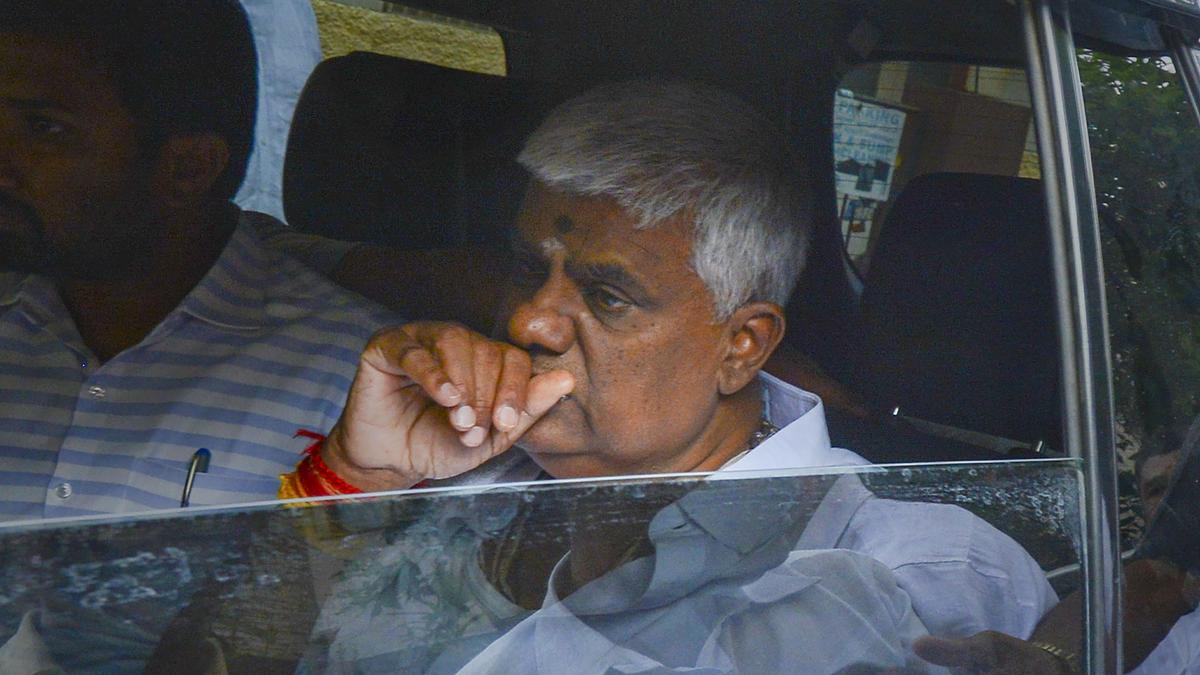
Abduction case: Karnataka High Court orders issue of notices to H.D. Revanna, SIT on petitions filed by them against each other
The Hindu
Karnataka High Court orders notices in abduction case against H.D. Revanna, challenging bail cancellation and interpretation of law.
The Karnataka High Court on Friday, May 31, ordered issue of notices to the Special Investigation Team (SIT) on a petition filed by former minister H.D. Revanna, who has challenged registration of an abduction case against him, and to Mr. Revanna on a petition filed by the SIT, which has sought cancellation of bail granted to him by a special court in the case.
Justice Krishna S. Dixit, before whom both the petitions came up for hearing, has adjourned the hearing on SIT’s petitions observing that the SIT has made out an arguable case by pointing out interpretation of Section 364A (kidnapping for ransom, etc.,) made by the Special Court of Sessions for criminal cases against MPs and MLAs in its May 13 order of granting bail to Mr. Revanna.
Earlier, Senior Advocate and SIT’s Special Public Prosecutor (SPP) Ravivarma Kumar had pointed out that the special court has committed an error in interpretation of Section 364A and the High Court has to examine whether the order of granting bail was perverse and arbitrary both in law and on facts of the case.
Meanwhile, Senior Advocate C.V. Nagesh, appearing for Mr. Revanna in the petition questioning the legality of registration of case under Section 364A of the IPC by K.R. Nagar police, has argued that the complaint, filed by victim’s son, has no ingredient for invoking Section 364A of IPC.
The ingredients like ransom, force or deceit are absent in the complaint as the woman had herself accompanied Satish Babanna, one of the accused, who had gone in a ‘right royal way’ to the woman’s house in K.R. Nagar and asked her to accompany him on his motorcycle, by allegedly stating that he was acting on Mr. Revanna’s instructions.
However, SPP Mr. Kumar, citing the meaning of the word “deceit” from the Black’s dictionary, told the Court that what has been made out in the present case is only a ‘trailer’ and lot more is yet to come. But Mr. Nagesh said that the sections of the IPC invoked in the First Information Report (FIR) cannot travel beyond the contents of the complaint.
The Court adjourned the hearing on the petition by ordering issue of notice to the complainant.

“Writing, in general, is a very solitary process,” says Yauvanika Chopra, Associate Director at The New India Foundation (NIF), which, earlier this year, announced the 12th edition of its NIF Book Fellowships for research and scholarship about Indian history after Independence. While authors, in general, are built for it, it can still get very lonely, says Chopra, pointing out that the fellowship’s community support is as valuable as the monetary benefits it offers. “There is a solid community of NIF fellows, trustees, language experts, jury members, all of whom are incredibly competent,” she says. “They really help make authors feel supported from manuscript to publication, so you never feel like you’re struggling through isolation.”

Several principals of government and private schools in Delhi on Tuesday said the Directorate of Education (DoE) circular from a day earlier, directing schools to conduct classes in ‘hybrid’ mode, had caused confusion regarding day-to-day operations as they did not know how many students would return to school from Wednesday and how would teachers instruct in two modes — online and in person — at once. The DoE circular on Monday had also stated that the option to “exercise online mode of education, wherever available, shall vest with the students and their guardians”. Several schoolteachers also expressed confusion regarding the DoE order. A government schoolteacher said he was unsure of how to cope with the resumption of physical classes, given that the order directing government offices to ensure that 50% of the employees work from home is still in place. On Monday, the Commission for Air Quality Management in the National Capital Region and Adjoining Areas (CAQM) had, on the orders of the Supreme Court, directed schools in Delhi-NCR to shift classes to the hybrid mode, following which the DoE had issued the circular. The court had urged the Centre’s pollution watchdog to consider restarting physical classes due to many students missing out on the mid-day meals and lacking the necessary means to attend classes online. The CAQM had, on November 20, asked schools in Delhi-NCR to shift to the online mode of teaching.









